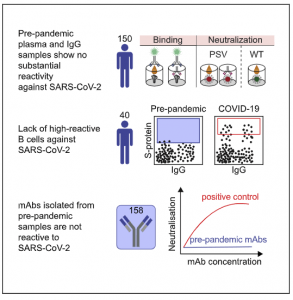Recent studies have showed that individuals who have not yet been exposed to SARS-CoV-2 demonstrate some form of T-cell immunity based on previous exposure to endemic human coronaviruses (HCoVs). Such observations have led to the investigation of B-cell immunity in these unexposed individuals. This type of immunity may contribute to an individual’s susceptibility to SARS-CoV-2 infection and COVID-19 disease severity.
Clinically SARS-CoV-2 infection can cause a variety of symptoms, some minor and some severe. Disease severity is, primarily, dictated by the immune response, despite being determined by a variety of factors. If an individual has been previously exposed to SARS-CoV-2, they may possess pre-existing immunity against SARS-CoV-2 which could lead to a less severe disease. Recent studies have reported pre-existing T-cell immunity against SARS-CoV-2 in individuals who have not been exposed to the virus. B-cell immunity on the other hand may be caused by cross-reactivity against related HCoVs or be pre-existing within naïve B cells.
It has been reported that some anti-SARS-CoV-2 antibodies share similarities with germline B-cell receptor sequences. How this translates to antibody responses and pre-existing anti-SARS-CoV-2 antibodies in unexposed individuals remains to be described. In a recent paper, Ercanoglu, et al., sought out to provide a detailed analysis of the B cell immunity to SARS-CoV-2 in unexposed individuals (Figure 1).
The researchers looked at pre-pandemic blood samples from 150 adults and demonstrated that individuals who have not been exposed to SARS-CoV-2 do not possess robust pre-existing antibodies and B-cell immunity against SARS-CoV-2.
Journal article: Ercanoglu, M. S., et al., 2022. No substantial preexisting B cell immunity against SARS-CoV-2 in healthy adults. iScience.
Summary by Stefan Botha











